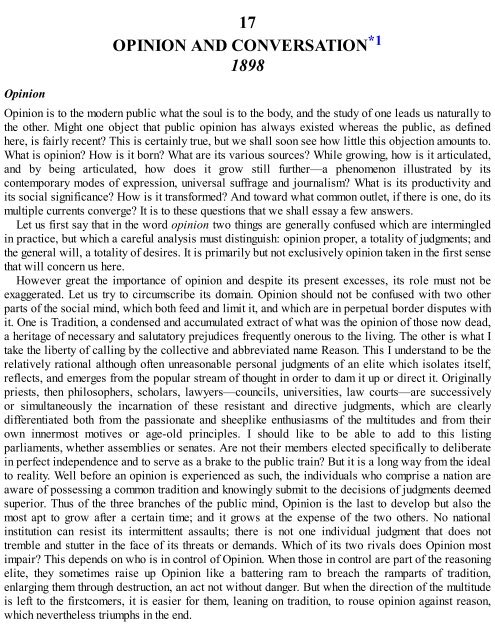3658925934
Create successful ePaper yourself
Turn your PDF publications into a flip-book with our unique Google optimized e-Paper software.
Opinion<br />
17<br />
OPINION AND CONVERSATION *1<br />
1898<br />
Opinion is to the modern public what the soul is to the body, and the study of one leads us naturally to<br />
the other. Might one object that public opinion has always existed whereas the public, as defined<br />
here, is fairly recent? This is certainly true, but we shall soon see how little this objection amounts to.<br />
What is opinion? How is it born? What are its various sources? While growing, how is it articulated,<br />
and by being articulated, how does it grow still further—a phenomenon illustrated by its<br />
contemporary modes of expression, universal suffrage and journalism? What is its productivity and<br />
its social significance? How is it transformed? And toward what common outlet, if there is one, do its<br />
multiple currents converge? It is to these questions that we shall essay a few answers.<br />
Let us first say that in the word opinion two things are generally confused which are intermingled<br />
in practice, but which a careful analysis must distinguish: opinion proper, a totality of judgments; and<br />
the general will, a totality of desires. It is primarily but not exclusively opinion taken in the first sense<br />
that will concern us here.<br />
However great the importance of opinion and despite its present excesses, its role must not be<br />
exaggerated. Let us try to circumscribe its domain. Opinion should not be confused with two other<br />
parts of the social mind, which both feed and limit it, and which are in perpetual border disputes with<br />
it. One is Tradition, a condensed and accumulated extract of what was the opinion of those now dead,<br />
a heritage of necessary and salutatory prejudices frequently onerous to the living. The other is what I<br />
take the liberty of calling by the collective and abbreviated name Reason. This I understand to be the<br />
relatively rational although often unreasonable personal judgments of an elite which isolates itself,<br />
reflects, and emerges from the popular stream of thought in order to dam it up or direct it. Originally<br />
priests, then philosophers, scholars, lawyers—councils, universities, law courts—are successively<br />
or simultaneously the incarnation of these resistant and directive judgments, which are clearly<br />
differentiated both from the passionate and sheeplike enthusiasms of the multitudes and from their<br />
own innermost motives or age-old principles. I should like to be able to add to this listing<br />
parliaments, whether assemblies or senates. Are not their members elected specifically to deliberate<br />
in perfect independence and to serve as a brake to the public train? But it is a long way from the ideal<br />
to reality. Well before an opinion is experienced as such, the individuals who comprise a nation are<br />
aware of possessing a common tradition and knowingly submit to the decisions of judgments deemed<br />
superior. Thus of the three branches of the public mind, Opinion is the last to develop but also the<br />
most apt to grow after a certain time; and it grows at the expense of the two others. No national<br />
institution can resist its intermittent assaults; there is not one individual judgment that does not<br />
tremble and stutter in the face of its threats or demands. Which of its two rivals does Opinion most<br />
impair? This depends on who is in control of Opinion. When those in control are part of the reasoning<br />
elite, they sometimes raise up Opinion like a battering ram to breach the ramparts of tradition,<br />
enlarging them through destruction, an act not without danger. But when the direction of the multitude<br />
is left to the firstcomers, it is easier for them, leaning on tradition, to rouse opinion against reason,<br />
which nevertheless triumphs in the end.









![Genki - An Integrated Course in Elementary Japanese II [Second Edition] (2011), WITH PDF BOOKMARKS!](https://img.yumpu.com/58322134/1/180x260/genki-an-integrated-course-in-elementary-japanese-ii-second-edition-2011-with-pdf-bookmarks.jpg?quality=85)
![Genki - An Integrated Course in Elementary Japanese I [Second Edition] (2011), WITH PDF BOOKMARKS!](https://img.yumpu.com/58322120/1/182x260/genki-an-integrated-course-in-elementary-japanese-i-second-edition-2011-with-pdf-bookmarks.jpg?quality=85)





